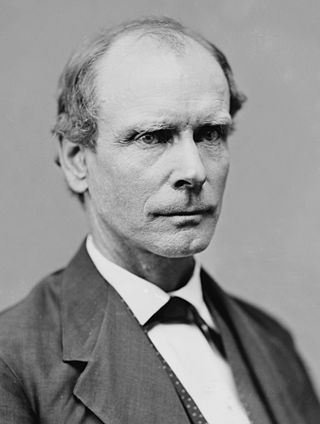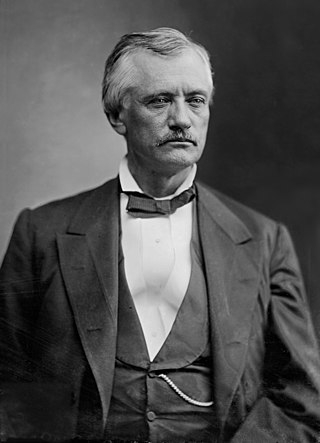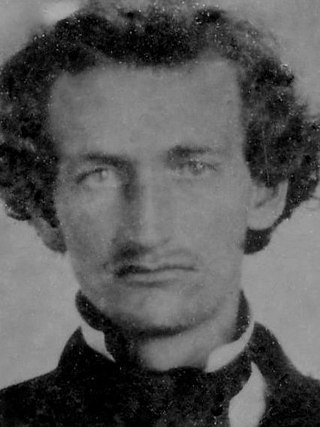
The Ku Klux Klan, commonly shortened to the KKK or the Klan is the name of several historical and current American white supremacist, far-right terrorist organizations and hate groups. The Klan was "the first organized terror movement in American history." Their primary targets are African Americans, Hispanics, Jews, Latinos, Asian Americans, Native Americans, Italian Americans, Irish Americans, and Catholics, as well as immigrants, leftists, homosexuals, Muslims, atheists, and abortion providers.

Amos Tappan Akerman was an American politician who served as United States Attorney General under President Ulysses S. Grant from 1870 to 1871. A native of New Hampshire, Akerman graduated from Dartmouth College in 1842 and moved South, where he spent most of his career. He first worked as headmaster of a school in North Carolina and as a tutor in Georgia. Having become interested in law, Akerman studied and passed the bar in Georgia in 1850; where he and an associate set up a law practice. He also owned a farm and enslaved eleven people. When the American Civil War broke out in 1861, Akerman joined the Confederate Army, where he achieved the rank of colonel.

The slave codes were laws relating to slavery and enslaved people, specifically regarding the Atlantic slave trade and chattel slavery in the Americas.

John Tyler Morgan was an American politician was served as a brigadier general in the Confederate States Army during the American Civil War and later was elected for six terms as the U.S. Senator (1877–1907) from the state of Alabama. A prominent slaveholder before the Civil War, he became the second Grand Dragon of the Ku Klux Klan in Alabama during the Reconstruction era. Morgan and fellow Klan member Edmund W. Pettus became the ringleaders of white supremacy in Alabama and did more than anyone else in the state to overthrow Reconstruction efforts in the wake of the Civil War. When President Ulysses S. Grant dispatched U.S. Attorney General Amos Akerman to prosecute the Klan under the Enforcement Acts, Morgan was arrested and jailed.
Slave patrols—also known as patrollers, patterrollers, pattyrollers or paddy rollers—were organized groups of armed men who monitored and enforced discipline upon slaves in the antebellum U.S. southern states. The slave patrols' function was to police slaves, especially those who escaped or were viewed as defiant. They also formed river patrols to prevent escape by boat.
The Enforcement Acts were three bills that were passed by the United States Congress between 1870 and 1871. They were criminal codes that protected African Americans’ right to vote, to hold office, to serve on juries, and receive equal protection of laws. Passed under the presidency of Ulysses S. Grant, the laws also allowed the federal government to intervene when states did not act to protect these rights. The acts passed following the ratification of the Fourteenth Amendment to the US Constitution, which gave full citizenship to anyone born in the United States or freed slaves, and the Fifteenth Amendment, which banned racial discrimination in voting.

The Enforcement Act of 1871, also known as the Ku Klux Klan Act, Third Enforcement Act, Third Ku Klux Klan Act, Civil Rights Act of 1871, or Force Act of 1871, is an Act of the United States Congress which empowered the President to suspend the writ of habeas corpus to combat the Ku Klux Klan (KKK) and other terrorist organizations who had terrorized and murdered innocent African Americans, public officials, and White sympathizers in the previous Confederate States of America. The act was passed by the 42nd United States Congress and signed into law by United States President Ulysses S. Grant on April 20, 1871. The act was the last of three Enforcement Acts passed by the United States Congress from 1870 to 1871 during the Reconstruction Era to combat attacks upon the suffrage rights of African Americans. The statute has been subject to only minor changes since then, but has been the subject of voluminous interpretation by courts.

A slave catcher is a person employed to track down and return escaped slaves to their enslavers. The first slave catchers in the Americas were active in European colonies in the West Indies during the sixteenth century. In colonial Virginia and Carolina, slave catchers were recruited by Southern planters beginning in the eighteenth century to return fugitive slaves; the concept quickly spread to the rest of the Thirteen Colonies. After the establishment of the United States, slave catchers continued to be employed in addition to being active in other countries which had not abolished slavery, such as Brazil. The activities of slave catchers from the American South became at the center of a major controversy in the lead up to the American Civil War; the Fugitive Slave Act required those living in the Northern United States to assist slave catchers. Slave catchers in the United States ceased to be active with the ratification of the Thirteenth Amendment.

James M. Hinds was the first U.S. Congressman assassinated in office. He served as member of the United States House of Representatives for Arkansas from June 24, 1868 until his assassination by the Ku Klux Klan. Hinds—an advocate of civil rights for former slaves—was active during the Reconstruction era following the American Civil War.
The Knights of the Flaming Circle was a militant organization founded in 1923 to fight the anti-Catholic Ku Klux Klan. They were part of an opposition that included politicians, labor leaders and immigrant groups. Membership was open to anyone who opposed the KKK and was "not a Protestant". They had significant support amongst various ethnic groups in Pennsylvania and West Virginia. Bryce Bauer has written that, "Instead of only admitting white, native-born Protestants as the Klan did, the organization vowed to accept anyone who was anything other than that."
Wyatt Outlaw was an American politician and the first African-American to serve as Town Commissioner and Constable of the town of Graham, North Carolina. He was lynched by the White Brotherhood, a branch of the Ku Klux Klan on February 26, 1870. His death, along with the assassination of white Republican State Senator John W. Stephens at the Caswell County Courthouse, provoked Governor William Woods Holden to declare martial law in Alamance and Caswell Counties, resulting in the Kirk-Holden War of 1870.

The Ku Klux Klan is an organization that expanded operations into Canada, based on the second Ku Klux Klan established in the United States in 1915. It operated as a fraternity, with chapters established in parts of Canada throughout the 1920s and early 1930s. The first registered provincial chapter was registered in Toronto in 1925 by two Americans and a Canadian. The organization was most successful in Saskatchewan, where it briefly influenced political activity and whose membership included a member of Parliament, Walter Davy Cowan.
Elias Hill was a Baptist minister and leader of a York County, South Carolina congregation that emigrated to Arthington, Liberia. In May 1871, during the Reconstruction era, he was among the victims in a series of attacks in York County against local blacks by members of the Ku Klux Klan. His situation received wide attention on account of his condition, as Hill had been stricken by an illness while a child which had left him crippled with his arms and legs in a withered state. He was known for preaching about rights and equality, and taught local children how to read and write.
Jim Williams was an African-American soldier and militia leader in the 1860s and 1870s in York County, South Carolina. He escaped slavery during the US Civil War and joined the Union Army. After the war, Williams led a black militia organization which sought to protect black rights in the area. In 1871, he was lynched and hung by members of the local Ku Klux Klan. As a result, a large group of local blacks immigrated to Liberia, West Africa.
James Rufus Bratton (1821–1897) was a doctor, army surgeon, civic leader, and leader in the Ku Klux Klan in South Carolina with whom he was guilty of committing numerous crimes. Bratton trained in medicine in Philadelphia in the 1840s but spent most of his life in Yorkville, South Carolina. He joined the Confederate Army as an assistant surgeon in April 1861, the opening month of the American Civil War. After the war, he became an opponent of Reconstruction and a leader of the Ku Klux Klan. He was one of the leaders linked in the lynching and killing of local black leader Jim Williams. This led to a string of violent attacks which eventually led to a large group of York County blacks emigrating to Liberia. Bratton fled to London, Ontario, to escape prosecution, but later was able to return to South Carolina, where he pursued his career in medicine for the remainder of his life.

Nancy K. MacLean is an American historian. She is the William H. Chafe Professor of History and Public Policy at Duke University. MacLean's research focuses on race, gender, labor history and social movements in 20th-century U.S. history, with particular attention to the U.S. South.

The Ku Klux Klan (KKK) arrived in the U.S. state of Oregon in the early 1920s, during the history of the second Klan, and it quickly spread throughout the state, aided by a mostly white, Protestant population as well as by racist and anti-immigrant sentiments which were already embedded in the region. The Klan succeeded in electing its members in local and state governments, which allowed it to pass legislation that furthered its agenda. Ultimately, the struggles and decline of the Klan in Oregon coincided with the struggles and decline of the Klan in other states, and its activity faded in the 1930s.
Reconstruction: America's Unfinished Revolution, 1863-1877 is a historical non-fiction monograph written by American historian Eric Foner. Its broad focus is the Reconstruction Era in the aftermath of the American Civil War, which consists of the social, political, economic, and cultural changes brought about as consequences of the war's outcome. The author addresses, criticizes, and integrates several historical perspectives of the Civil War that first appeared during Reconstruction, such as the reconciliationist, white supremacist, and abolitionist perspectives, into a single cohesive academic narrative based on primary sources, such as newspaper quotations and interviews with Americans who lived through the era, as well as secondary sources, such as other texts written on the subject. The author divides the primary topic of the Reconstruction Era into several subcategories, addressing them individually throughout the text while also integrating them into a larger context. Such subtopics addressed by the book include the gradual abolition of race-based chattel slavery, the gradual emancipation of the previously enslaved, the Reconstruction Amendments, the integration of the previously enslaved into the post-war society, the continuation of Manifest Destiny, the development of new White Supremacist ideologies and groups in both the North and the South, racist pogroms and massacres carried out against the freedmen by former confederates, police, state officials, and vigilantes, the relationship of the newly freedmen to the previously free men, the relationship of freedmen to their former masters, the ascendancy of America's industrial bourgeoisie after emancipation, the dissolution of the wealth and power of the semi-feudal Southern slave aristocracy, the re-integration of Confederate states into the Union, the erection of legal frameworks to elaborate upon and reinforce emancipation, such as the Freedmen's Bureau, the development of systems of education for freed slaves, black male suffrage, the reuniting of African American families separated by slavery, the relationship of newly freed African Americans to the political economy, the appearance of state-sanctioned segregation, regional differences in how Reconstruction was handled, and attempts by freedmen to achieve subsistence and political independence outside the dual frameworks of Northern paternalism and Southern attempts to restore the old order.
Sally Hadden is an American historian. She is associate professor and the director of graduate studies in the history department at Western Michigan University and the author of Slave Patrols: Law and Violence in Virginia and the Carolinas. Her other books include Signposts: New Directions in Southern Legal History, A Companion to American Legal History, and Traveling the Beaten Path: Charles Tait's Charges to Federal Grand Juries, 1822-1825.










